#white knight revolution
Text
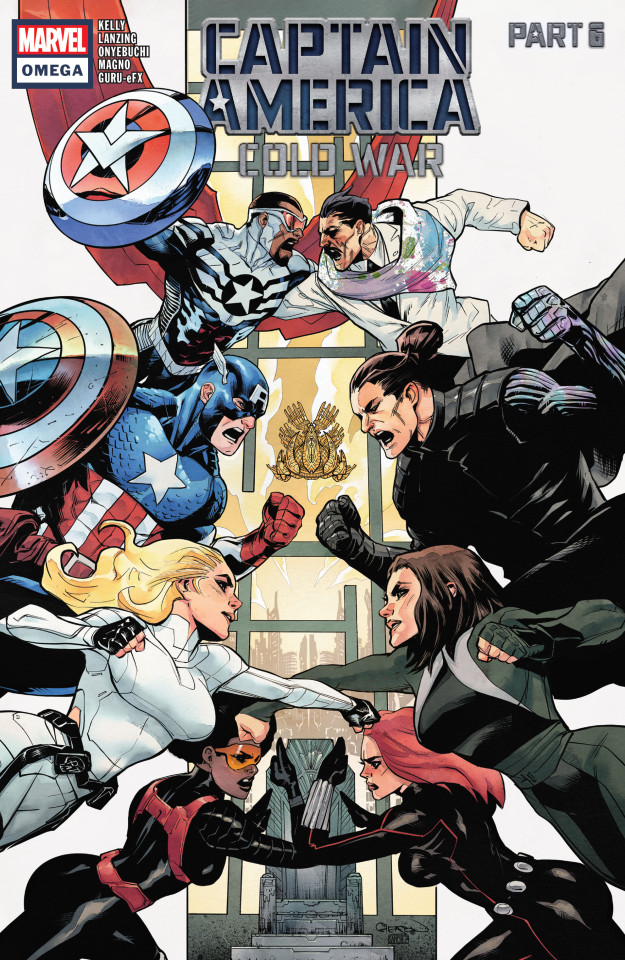
“We’re gonna need clear heads for this. A frontal assault’s not going to cut it.” -- Steve Rogers
Cover art for Captain America: Cold War Omega #001
Art by Patrick Gleason
#captain america: cold war omega#captain america#sam wilson#steve rogers#white wolf#hunter#the new revolution#bucky barnes#destroyer#sharon carter#the dryad#peggy carter#misty knight#black widow#natasha romanoff#cover art#marvel#comics#marvel comics
13 notes
·
View notes
Text
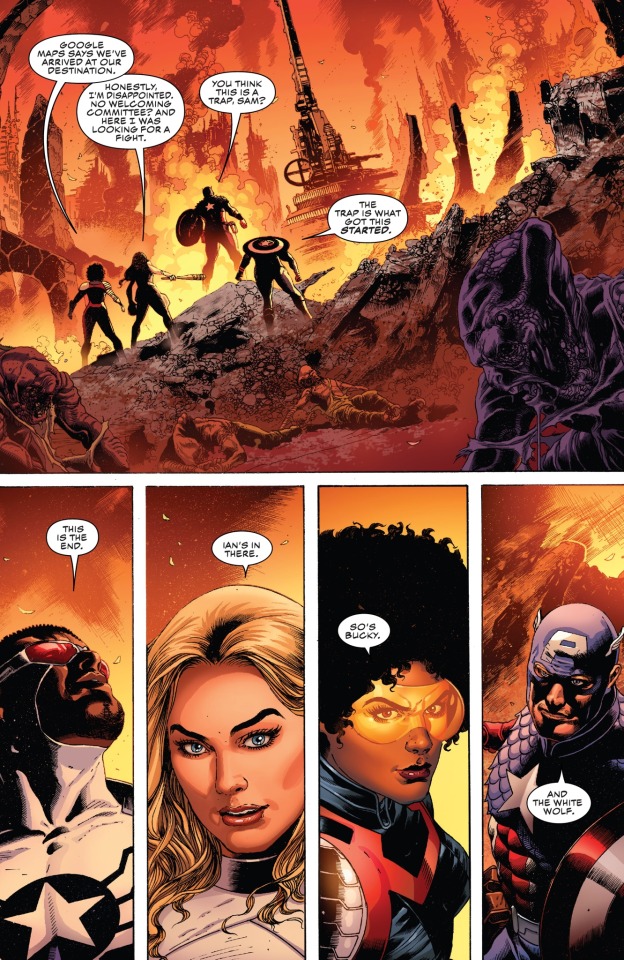
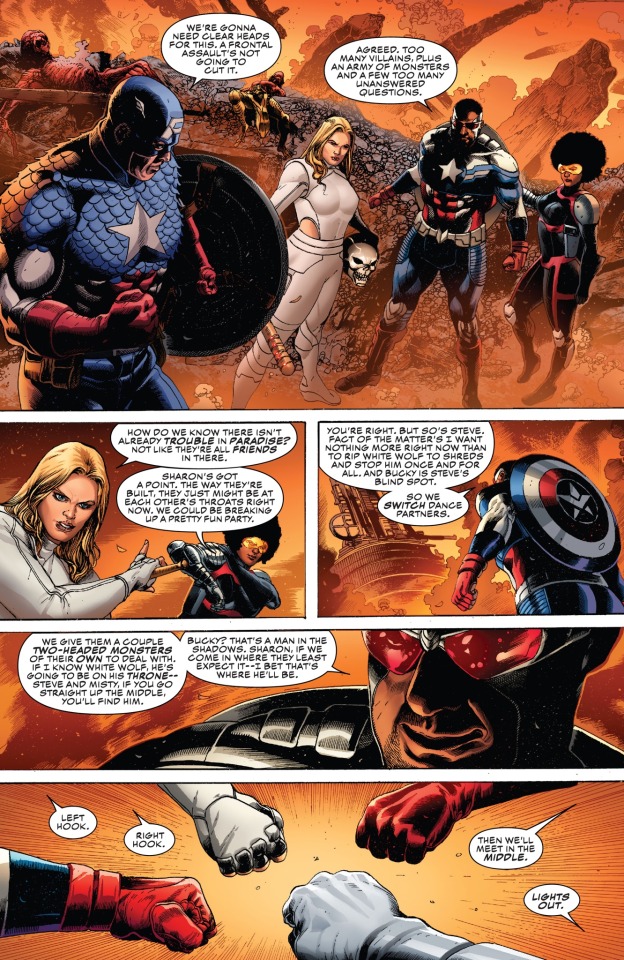

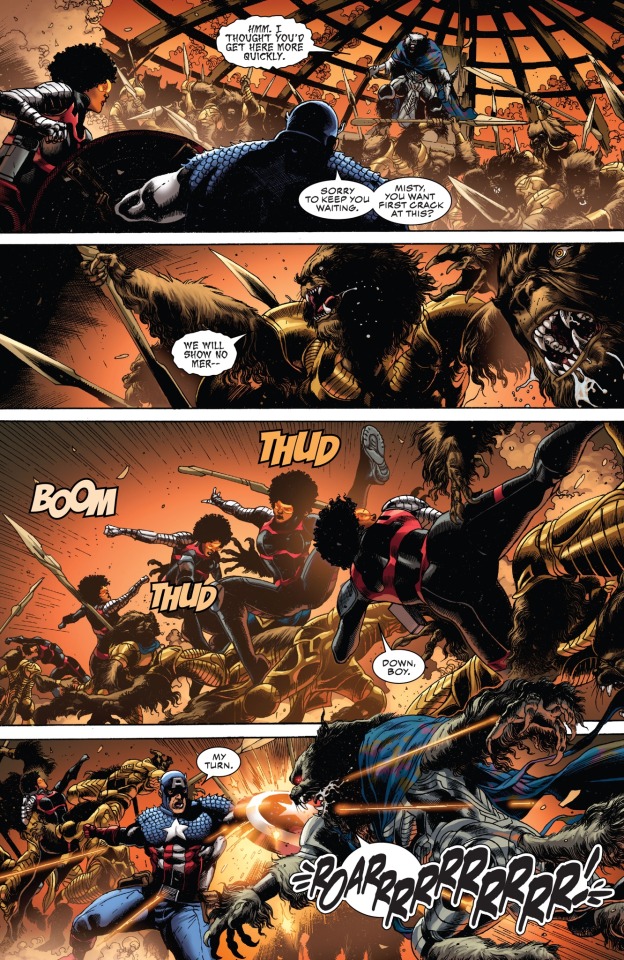
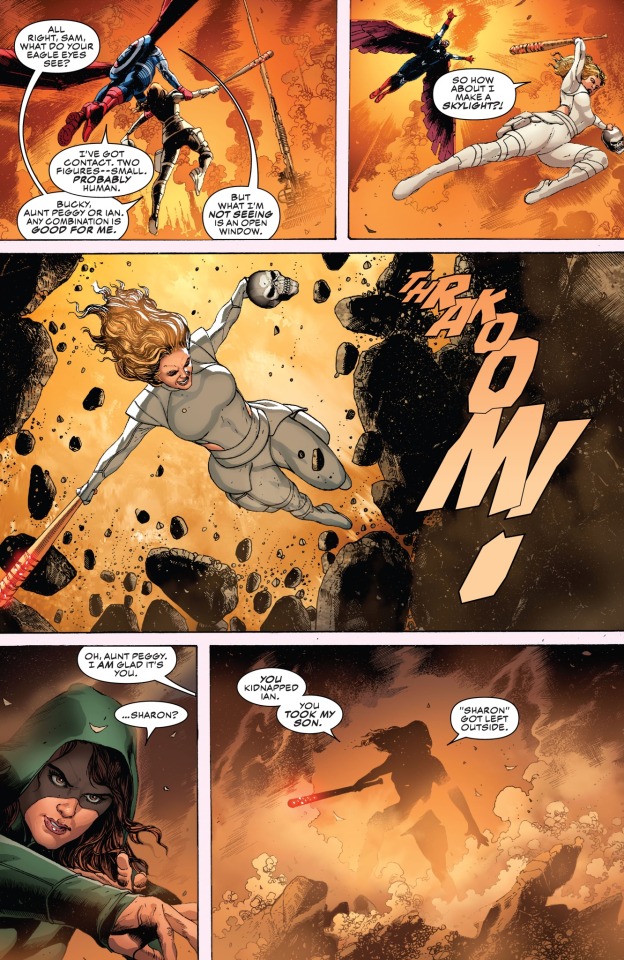

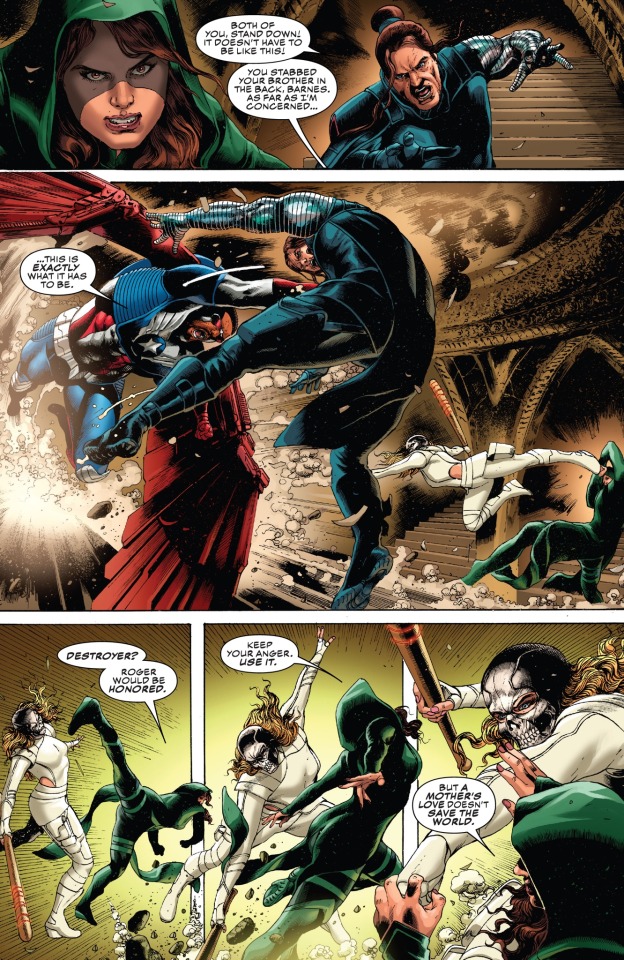
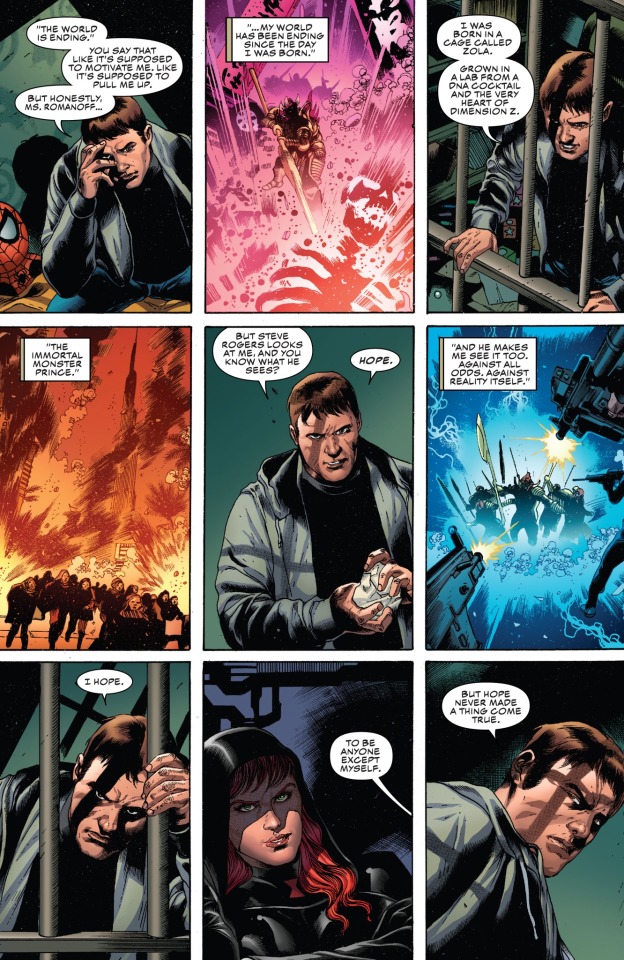



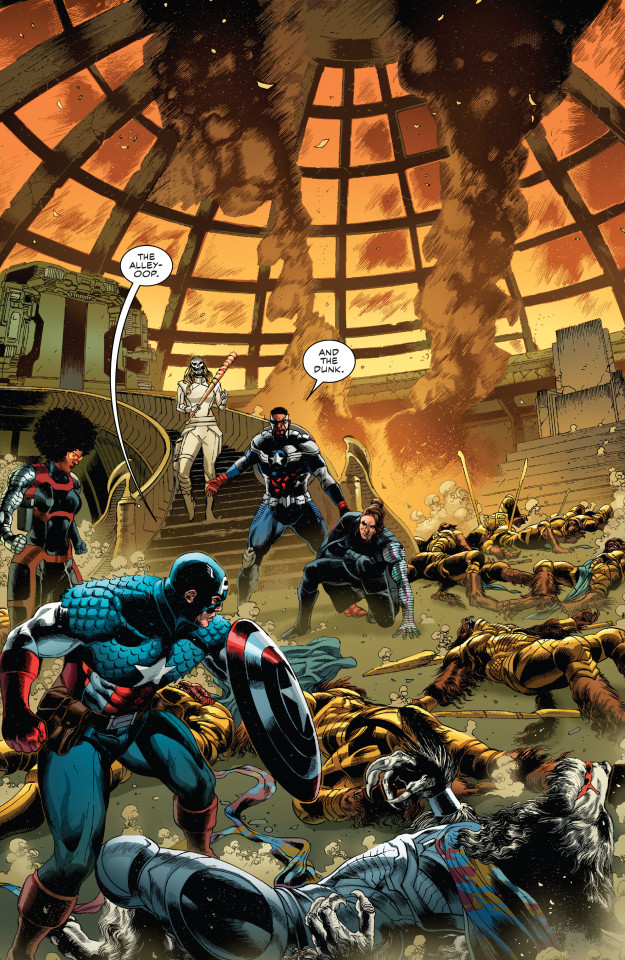
Captain America: Cold War Omega #1
#cold war (marvel)#captain america#steve rogers#sam wilson#destroyer#sharon carter#misty knight#the new revolution#bucky barnes#white wolf#dryad#peggy carter#ian rogers#natasha romanoff#marvel comics#marvel spoilers#matt reads a thing#i posted this
13 notes
·
View notes
Photo

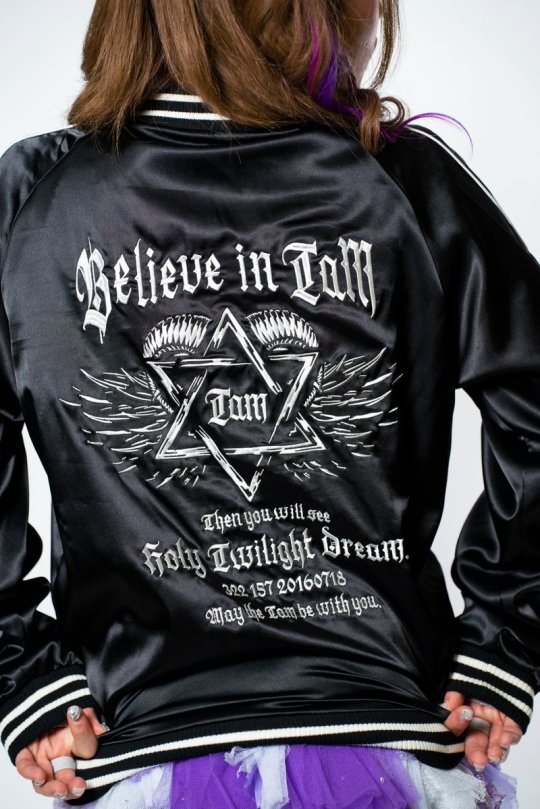

#joshi puroresu#stardom#tam nakano#cosmic angels#'revolution'. 'white knight'. 'believe in the tam'. girl she is going to start a cult#cosmic angels is a cult pass it on#the choreography is a ritual dance
13 notes
·
View notes
Text
All That Glitters is Not Feminism - An Analysis of LO's Brand of "Feminism" and What Remains of its Fanbase (A Prologue)
So I referenced a certain article in a recent reblog/ask response and I just need to talk about it because what the actual fuck-
This has to have been written by either a bot or a hater who's reached peak god tier level at playing the long con sarcasm game because NOTHING about this feels sincere or even factual. Much of it almost has to be read in a mocking tone for it to make any real sense.
It says "Lore Olympus" (literally in quotations) in just about every single paragraph over and over again and every single talking point revolves EXCLUSIVELY around Persephone, which I suppose comes as no surprise considering that seems to be all the comic - and its fanbase - cares about at this point.

I really love (/s) how Persephone's "evolution" is being naive and then 'blossoming' into an independent woman who relies entirely on the rich man who groomed her to solve all her problems.
Also all she's done since becoming Queen of the Underworld is abuse lower class people. That's the stuff feminist dreams are made of <3
While we're talking about the main leads, "poster child" is definitely a word for Hades, I think a more appropriate term would be "literal child". And boy howdy, 'god of consent' sure is a title to give the guy who ripped out a lower class satyr's eyeball and beat him half to death.
This man owns slaves, btw. And both he and his "powerful wife" are equally horrible to lower class people, especially women.
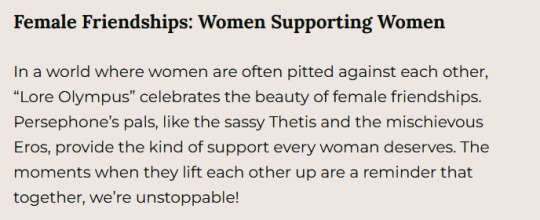
This is hands-down the funniest section of the article and we're only three bullet points in.
Thetis and Persephone have never even so much as spoken one word to each other outside of the courtroom that Thetis technically put her in after plotting against her for an entire season.
Eros is a man. Nothing wrong with that but it comes with the unintentional icky hilarity of implying that because Eros is the gay best friend, that means he's a woman.
They literally don't read this fucking comic-

Everyone always relies on this weird talking point of Demeter not being able to "let Persephone go"... y'all, she just didn't want Persephone to outright move to Olympus, she wanted her to commute. That was it! That was literally the only problem! She wasn't preventing Persephone from pursuing a higher education or telling her she wasn't allowed to work, she literally fucking encouraged it! And with the added later context of Persephone killing a bunch of mortals - and, ironically, the fact that Persephone was assaulted/put in harm's way by TWO SEPARATE MEN in the first two days of her time in Olympus - yeah, I don't blame Demeter for not wanting her daughter to move cold turkey actually LOL
Also hilarious that they claim Rachel has turned "tradition" into "innovation" when the only thing she's managed to do is set back modern feminism in her young adult readers by 80 years and re-establish misogynist brainwashing in her adult ones. Rachel, your fanbase was literally shipping a victim of abuse with her abuser just a few days ago.

oh boy this is uh
this is some cult shit ngl
and the "rewriting the script of Greek mythology" part is VERY concerning knowing what we know about Lore Olympus and who it was written by. This is literally cultural appropriation, full stop, and it exists because Lore Olympus - and works like it, made by people like Rachel - exists.
I can't even commit to the original theory that this was written by a bot because it all feels very pointed and intenetional. This is being written by someone who, at the very least, REALLY sucks at media analysis and writing, because the entire article is just "Lore Olympus, buzzword, Lore Olympus, buzzword, buzzword, Lore Olympus", it's like a white knight incantation for guilty virtue signallers who have zero clue what they're talking about. And at worst, yes, it's appropriation from someone who doesn't mind taking a culture's stories and myths and promoting their erasure by people outside of the culture like Rachel.
And that's it, that's literally the article lmao
*EDIT: There was a section here before addressing the writer of the article from a very opinionated POV that, while isn't unusual for what I do here, did feel necessary to remove after I was contacted by the article writer who addressed the flaws in their original article and is now seeking to correct them with revisions/an article rewrite. So I felt it only fair as a compromise to at least remove that section as it really doesn't have a whole lot to do with this post as a whole and can be removed without entirely ruining the flow of this analysis. If/when that article is rewritten, I'll be revisiting this post and my overall analysis !
And honestly, it's all really telling, because this does accurately reflect the state of the LO fanbase.
Not only do many of the people who defend this comic like it's their job not pick up on the blatant misogynist tones that are going on in its narrative (I can't even call them "undertones" anymore, they're no longer that subtle) but whether or not they even read the comic at all is up for debate with how much stuff they tend to get wrong in their own arguments and justifications. And this is something that's VERY regularly seen in the fanbase discussions, readers will constantly be unaware of things that happened because they skimmed through it at lightning speed just to see if Hades and Persephone kiss and so they can get the top comment on Webtoons so they can be "ahead of the fanbase". It's no wonder that Rachel has gotten used to getting away with retconning things because her fanbase didn't even read what she established the first time.
Rachel's fanbase was literally defending the romance ship of an abuser and his victim on the newest FP episode preview. When that FP episode came out two nights ago and Hera said, point blank, that he didn't love her but abused her, I could only think of that portion of the fanbase who was very audibly simping over Kronos in the IG comment section. Are they actually having their moment of shameful clarity now? Or are they just gonna move the goalposts and pretend that didn't happen?
I don't want to say anything bad about Shelby here because she really seems like she's fighting for her life on this site that she's trying to get off the ground, but a lot of her other articles also come across as very one-note while being peppered with buzzwords that make it seem like what she's talking about is "progressive" when it really isn't. Case in point, Lessons in Chemistry has been commonly criticized for not actually appealing to the demographic that its Mary Sue-ish main character is supposed to represent - women in STEM career fields.
I've said it before, and I'll say it again: Lore Olympus is not 'feminism', it's white feminism that is designed to appeal to predominantly heterocis white women who think the solution to misogyny is to willingly submit to it and accept the status quo - that it's "empowering" if the woman is smiling and having all her needs paid for by a man. Sure, I can accept that different women will be looking for different relationship dynamics, some women genuinely are happy being in a relationship where they support their husbands first and foremost. But can that truly be called feminism? Or is the real feminism the choices we make along the way that we should be given the freedom to make?
It says a lot about the folks who tend to regularly prop up LO on a pedestal like this as some "revolution in feminism" despite the contrary after spending more than just 30 seconds skimming the attention-grabbing art, and Shelby is just one of many. She's not the worst of the bunch, though.
That goes to someone else who I want to give proper light to in their own essay. Someone who definitely earned a good stern talking-to this past week and has, thankfully, had consequences dished out to her for her horrible actions towards queer POC writers.
If you know, you know. If you don't, buckle up.
205 notes
·
View notes
Text
BATMAN BEYOND/TERRY McGINNIS; a reading list
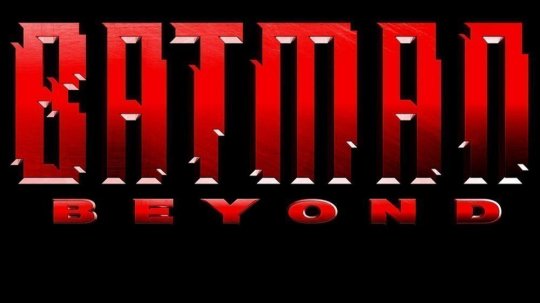
So, you're interested in the Batman of the future! A series which takes place in the far off year of... 2039? Listen, the original show came out in the nineties, you gotta give it some slack.
Hopefully here I've compiled a nice list of the comics, as well as any extra appearances of Terry, Batman of Neo-Gotham.
Who is Terry McGinnis?
Terry McGinnis is our seventeen year old protagonist. He meets Bruce Wayne after the old man helps him in beating back a gang who take after the late Joker, and in helping Bruce into his manor discovers that he was formerly Batman. After his father's murder, Terry steals the hi-tech batsuit in order to hunt down the people responsible for his death. In doing so he sees Gotham for how corrupt it really is, and becomes the Tomorrow Knight and Batman of the future.
Where to start?
The best place to start is with the 1999 animated series of the same name. It takes place firmly in the DCAU, alongside Batman: The Animated Series and The Adventure continues, Superman TAS, Justice League and Justice League Unlimited.
The show goes over three seasons, with cameos in a spin off called The Zeta Files (which only ran for a season) Static Shock (ep, Future Shock) and Justice League Unlimited (The Once and Future Thing; part 2, Epilogue) and a movie, Batman Beyond: Return of the Joker.
While the cameos are more optional, you don't really need to watch them, though Epilogue is treated as the 'end' of both JLU and Batman Beyond. ROTJ also has two different versions, a censored and uncensored one.
You can watch it on WatchCartoonsOnline, though I'd be a little careful with using that site. If you also have MAX, it should be available for streaming on there.
Comics wise, I apologize for not putting individual issues. I've also included links to readcomicsonline for each comic.
DCAU Tie-In Comics
These tie in directly with the show, and as far as I know, were released at the same time.
Batman Beyond I
Batman Beyond II
Superman Adventures #64
Unlimited and 2.0
The unlimited and 2.0 comics take place post show, and are in the same universe as the DCAU so I personally consider it canon to the series.
Batman Beyond: Hush Beyond (2010)
Batman Beyond: Industrial Revolution (2011)
Batman Beyond: 10,000 Clowns (2012)
Batman Beyond Unlimited
Batman Beyond 2.0
Justice League Beyond
Justice League Beyond 2.0
(and optional, the Superman Beyond comics. I think Terry only has some cameos, but it's always fun to hang out in the world a little bit with different characters)
Superman Beyond 2011
Superman Beyond 2012
N52 Futures End and Rebirth
Futures end is... personally, I'm not a fan. While Terry isn't Batman for the entirety of 2015, 2015 takes place in the aftermath of futures end, while Rebirth is the aftermath of 2015, only a few months later.
N52 Futures End #1-17 #18-30 #31-48
Batman Beyond (2015)
Batman Beyond Rebirth
Neo-Year
A reboot of BB, Urban Legends #7 and Neo-Year set off as Terry's own personal sort of 'year one' as Batman, one without Bruce. I'm personally highly enjoying it so far, and I feel like it does treat his character very well. Neo-Gothic is currently on-going.
Urban Legends #7
Batman Beyond: Neo-Year
Batman Beyond: Neo Gothic
Optional Individuals and Cameos
Batman #700
Superman/Batman 2010 Annual #4
Milestones 30th Anniversary A story with Static and Terry
Batman 2016 #135
Countdown #21 (Just a brief cameo)
Justice League vs The Legion of Superheroes #3
Batman: Beyond the White Knight
This is as comprehensive of a list as I can get, including almost every appearance of Terry's that I can think of. I hope that this helps anyone who is interested about Terry, he's personally one of my favorite characters and I think he's really fun and compelling.
173 notes
·
View notes
Text
Five Ten Under 500
There have been a bunch of open tags on this one but @three-drink-amy tagged me directly so here goes. To start I have to say it's wild to me, as someone coming from small or quiet fandoms, and who joined the RWRB community well before the movie, that netting under 500 kudos is now considered a lower number in this fandom. A couple of years ago it meant a lot to me to hit 500 kudos for the first time on a fic. Anyway.
I've loved seeing everyone's lists (so many new fics added to my tbr!), but they've also reminded me that there is a definite recency bias, especially among fics that didn't already have a good number of kudos. So, all of my choices are fics that were released before the movie came out. Even with that, I couldn't stick with only five, so you get five more under the cut (and I still had to leave out a lot of fics I loved, including others from the same authors listed here).
Culper Ring, 1778–1783 by @historicallysam
This is a series of 10 vignettes set during the American revolution and not one of these fics has over 100 kudos, which is a crime. So well-written and researched, and full of intrigue and feelings, I will always champion this series of fics.
Why Do We Even HAVE That Curse? by @cricketnationrise
The Mummy AU. Who doesn't love The Mummy?? I might be biased because I betaed this one but if you love action and adventure and romance, you must read this!
The Way You Seemed by @orchidscript
1950s High School AU—think Grease but gayer. I think this might be one of the first Cora fics I read, and it bowled me over. The vibes, the romance, the historical accuracy, it's so so excellent.
Red, White, & Royal Ballet by @tintagel-or-cockleshells
Ballet AU. Everything you want out of an enemies/rivals to lovers arc, and so much excellent ballet. Includes videos!
Love and Hate at the Farmers' Market by @myheartalivewrites
Farmers market vendors AU. This is soooooo adorable and about to be very seasonable! Never get tired of Alex being mad about Henry's very existence.
El Chico Del Apartamento 512 by @14carrotghoul
A cute little enemies-to-lovers neighbors AU and an absolute riot!
Soli by @cheesecurdsgravyandfries
Orchestra AU! As an oboist, Henry as principle oboe owns my entire heart. This is so sweet and lovely!
make the yuletide gay by @dumbpeachjuice
The concept behind this one is absolutely unhinged, but it's just as hilarious as you would expect from our dear peaches. Put it on your list for reading this holiday season!
a pillar i am, upright by inmoonlightigetseasick
Surprise surprise, another historical AU. Medieval knight/prince, together at the front of war. Really wonderful development of their relationship and truly excellent vibes.
and if you'll forgive me the self-promotion...
The Spirit of Giving by yours truly
Also for the holidays, a neighbors AU that leans heavily on the food as a metaphor for love trope.
110 notes
·
View notes
Text
START PAGE
Me myself can no longer find my posts when I need it, so I decided to combine them in some order for future reference.
I don't know Japanese, so I don't do translations. I can write, but I don't know English enough to try to write something more significant than regular posts. So I'm just giving some retellings and summaries, expressing my love and frustration… but mostly I'm just making jokes.
Ikemen Prince
Ikemen Vampire
Ikemen Villains (JP)
Ikemen Villains (EN)
Ikemen Sengoku
Ikemen Genjiden JP
Ikemen Revolution (archive)
Other games
Midnight Cinderella
23/01 (Leo and Alyn)
Sid (so familiar) Sid (part 2)
Byron (love at first sight)
Albert (so cute) Albert (Benjamin)
Love and DeepSpace (archive)
VA jp (Zayne) VA kr (Xavier) VA kr (Rafayel) VA kr (Caleb)
birthday Xavier (heart rate) Zayne loves me
Mystic Messenger and Ssum
Ray April Fool's DLC Seven
Comparison games
Wolfs Pets My heart on 11/11/23 Aggressively defensive
Faces of the games Birthday presents Familiar backgrounds
Sirius and Ibuki My fav smiles The same VA (how could it be?)
Purple eyes Villain's logic Drama Princess
...and grumbling
bad written story (Faust) time zones No luck (cards)
That's just not fair (Jude)
...and my scribblings
Alternative prologue IkeVamp: Prologue Picture
Bread
#cybird ikemen#ikemen series#cybird#ikemen games#ikemen prince#ikepri#ikemen sengoku#ikesen#ikemen vampire#ikevamp#ikemen revolution#ikerev#ikevil#ikemen villians#ikemen villains#ikemen genjiden#ikegen#midnight cinderella#love and deepspace#love and deep space#l&ds#the ssum#mystic messenger#mysme#main page
35 notes
·
View notes
Note
Hi, I hope you are doing well. I am not sure if you have spoken about this before but about Edmund, what period of time is his fantasy realm/kingdom set in? Is it some where in the middle ages (476 A.D - 1450 A.D) or maybe the early modern era (1450 A.D - 1750 A.D) or possibly in the 1800s (Victorian era and the first industrial revolution)? Or maybe a mix between some of these time periods since it is a fantasy.
I think it would help me pin point what type of clothes Edmund and his people would be wearing for the time, and help me picture it a bit better. Like is it similar to game of thrones or the lord of the rings, kind of fantasy or more of a shadow and bone/six of crows kind? (They are only books I can of at the moment).
Anyway if you answer thank you in advance :)
i have not read or watched either of that so i have no idea what you're referring to. I have stated before that it is unclear and a mix of a sterotypical mediveal fantasy world with victorian society, but i can elaborate a bit.
If you saw the interior of his house on the poll a few days ago, you can see that it is very much stolen from Versaille and castles before that time, because the castle itself is a mix between a baroque and a dracula styled castle.
But then also, the technology could be a mix. There's marble bathtubs, some kind of elecricity (if you think about all the chandeliers and streetlights in the castle's garden) but frequent use of kerosene lamps etc
Ocean liners does not exist, but typical "pirate" ships do. Knights exists, police does not. Witchcraft/magic is debatable, i haven't added that yet but could be persuaded to do so for the future.
As for fashion FOR EDMUND probably 1800s royal fashion, fairly modern. No funny pants or pantyhoses, but could have the extravagant white tissue-looking thing in the neck. I see him as dorian gray to be honest lmao, so do with that informstion what you will. And for his darling, I see those kind of medivial flowy dresses. NOT the cone hats with fabric though.
It's very much a mix of everything that i think looks good lmao
39 notes
·
View notes
Text
Meredith's Mistakes: A Study in Power
The full-scale rebellion of mages across Thedas against the Circle system of the Andrastian Chantry officially begins in 9:40 Dragon, with the uprising at the White Spire and a vote by the College of Enchanters to separate from the Chantry. But the seeds of the rebellion are planted years earlier in Kirkwall, where the extreme Circle policies of Knight-Commander Meredith Stannard lead to the destruction of the city’s Chantry by apostate mage activist Anders.
Knight-Commander Meredith’s reign of terror over her Circle and over Kirkwall itself is abruptly ended during her battle with Hawke when the sword forged from a red lyrium idol found in the Deep Roads corrupts her totally, turning her to a frozen lyrium statue herself (though as we have more recently learned, it did not destroy her completely). This was catalyzed by the destruction of the Chantry, Meredith’s invocation of the Right of Annulment, and the mages’ subsequent resistance. But had all that not happened the way it did, I believe that an end to Meredith’s rule had already become inevitable. The Knight-Commander makes several grave mistakes in maintaining her power, some of which begin years before she acquires the idol, but are dramatically escalated by her exposure to red lyrium.
And it’s because of those mistakes that the mage rebellion truly has its roots in Kirkwall.
Circle Dispensation
Throughout the Dragon Age universe we meet mages like Wilhelm Sulzbacher, Ines Arancia, Severan, Vivienne, Finn, and Wynne: Circle mages given special dispensation to travel, work, and even live outside the Circle proper.
This privilege proves to be a highly effective tool of Circle control, and a critical part of the Chantry's strategy for keep mages contained.
Prior to the the destruction of the Kirkwall Chantry, it seems that this sort of thing is quite commonplace in most Circles. Not for most mages, of course. But for well-established Enchanters who have proven their magical competency, and most importantly their loyalty, certain privileges may be afforded. Thus, compliance is incentivized for any mages who might aspire to some limited but additional freedoms and are willing to toe the line to get them.
In most cases, these mages are still denied the rights of non-mages: to own property, to hold a title, to marry and raise a family. (Wilhelm is a notable exception to the latter, but this seems rare.) But a mage like Ines Arancia might be afforded the opportunity for field research and publication. A mage like Wynne or Finn might gain the prestige of traveling at the side of a hero. And a mage of ambition such as Severan, Wilhelm, or Vivienne might even attain the title of Court Enchanter, serving at the side of a King or an Empress (even if the title is in many cases purely ceremonial) and mingling with the court.
Here's a basic principle that is critical to understanding politics, real or fictional: most people are primarily concerned with the material wellbeing of themselves and their immediate loved ones. Many people will engage in various forms of activism in the hopes of improving conditions for themselves and others, but truly revolutionary activity is an extremely unappealing prospect for the average person most of the time. And it's not because they're callous or apathetic. It's because they have too much to lose. Revolution is bloody and horrific and sometimes necessary, but there are always heavy costs to be weighed against the potential (and by no means guaranteed) gains.
It is no accident that of the mages we meet and get to know personally, the ones with the most to say in support of the Circle are also the ones who have gained significant privileges within that system—and who therefore have the most to lose from an attempted rebellion which may not succeed. I have written before about the conversation between Wynne and the Warden in Awakening, in which Wynne expresses concerns about the College of Enchanters potentially voting to break away from the Circle. "The mages will never be free," she says. "The Chantry would never allow it. Our only hope for survival is to show them we can be trusted."
Notably, at this point in time, even Anders will agree that this is "madness" and "a recipe for disaster." Why would Anders, of all people, say this, given how adamant he is about his own freedom? Awakening Anders sums up what he wants out of life pretty well when he says, "All I want is a pretty girl, a decent meal, and the right to shoot lightning at fools." He's being glib here, of course, and there's probably a lot more going on under the surface (we're given to understand later that Anders has always had a lot of anger at the Circle), but I do think it's accurate to say that at the moment he's mainly concerned with maintaining his own freedom. And while he and Wynne have very different opinions of the Circle generally, I think Anders doesn't at this time relish the thought of a full-scale war, with Templars roaming the land hunting renegade mages. You can see how that might actually make it harder for him to fly under the radar as an apostate.
Nearly a decade later, Vivienne will express her own opinions on the mage rebellion that is already well underway, calling it "A failure of perspective that infected Circle leadership." Unlike Wynne, Vivienne's objections are less about the unstoppable power of the Chantry and more about the attitudes the general population holds toward magic. "Kirkwall gave the world a reason to remember its fear of magic," she says. "A mage killed hundreds with a snap of their fingers. …By voting when they did, my colleagues all but declared war upon the ordinary people of Thedas, a war in which we are outnumbered a hundred to one." Vivienne's argument (if you take it at face value) is that the rebellion was poorly timed and generally unwise. "By all means, protest abuses by templars," she says. "Just don't do it in a way that suggests mages support wholesale murder."
Notice that Wynne does not say that mages shouldn't be free but that they won't be free. She does not say that bowing to Chantry oversight is the right thing to do but that it is mages' only hope for survival. Vivienne's objection (as stated, anyway; Vivienne’s motives are complicated and another post for another day) is not that the vote for independence supported murder but that it appeared to support murder. In these conversations, the argument is never really that mage rebellion is immoral, but that it is unwise, impolitic, bad optics, bad public relations, not smart.
A point on which even Anders once agreed.
And why would a full-scale mage rebellion look like the best option to Wynne and to Vivienne—to mages who have spent years and decades working to gain the respect and trust required to be granted the maximum amount of lenience the Circle allows? Why would they throw away what they have gained for a war they don't believe they can win?
If enough mages believe that compliance is a more reliable strategy than resistance, you won’t get the critical mass for a rebellion.
But even Wynne fights back when the Right of Annulment is invoked upon her Circle.
One of the most foolish things a ruler can do in terms of maintaining their own power is to allow conditions to deteriorate to the point where their subjects feel they have little or nothing left to lose. And that's exactly what happens in Kirkwall.
This is Knight-Commander Meredith's first mistake: she fails to positively reinforce compliance.
We get the sense that the Gallows was always a strict Circle. There's talk of the Knight-Commander's severity when Hawke first arrives, long before Meredith gets her hands on red lyrium. The kind of special dispensation that Wynne and Finn enjoy from the Fereldan Circle is likely far less common here.
There is some evidence that such things occur under Meredith, even post-lyrium-sword, however rare it may have been. Notably, if Bethany Hawke goes to the Circle, she is given permission to go with Hawke to the Vimmark Mountains, and to Chateau Haine. In terms of game mechanics, this is obviously done so that the player can have a bit more time with their sibling as a companion, and for the Legacy DLC specifically, the Carta has actually been breaking into the Circle trying to capture Bethany, so it does make some sense that Meredith would want that dealt with, enough to let Bethany go with Hawke to deal with it.
But Chateau Haine is purely a pleasure trip, and Bethany is still allowed not only to leave the Gallows, but to travel outside Kirkwall with her sibling. It would be very easy for her to run away if she chose, and she would have a solid head start on the templars pursuing her. Bethany has demonstrated herself a loyal Circle mage at this point, with no intention of escaping, but I think that's not all that's going on here.
Let's talk about Emile de Launcet.
In Act III, Hawke is given the task—or has their arm twisted, depending on how you're playing—of tracking down three runaway mages. The first two, Huon and Evelina, are a blood mage and an abomination respectively and attack, leaving Hawke no choice but to kill them. The third, however, is a man named Emile de Launcet, who reveals that having been in the Circle since he was six years old, he simply wanted to live a little. He also reveals that he himself spread the rumor that he is a blood mage, hoping that it would make him seem "dangerous" and therefore more attractive to women.
It's easy to write off Emile as simply a fool, but I think there's more going on here.
How does a man who has spent almost his entire life in the Gallows, who is well-acquainted with the Knight-Commander's policies, think that telling people he's a blood mage is a good idea? In Act III? By this point in the game, it is well known that Meredith is accusing anyone who sneezes of being a maleficar; most of the Circle mages live in terror of just such an accusation. What in the Maker's name could possibly make this man believe that labeling himself a blood mage wouldn't get him killed, or made Tranquil, never mind caught?
Unless Emile de Launcet, the son of rich Orlesian expats (the Comte and Comtess Guillaume and Dulci de Launcet) has always received more leniency in the Circle than the average mage.
Bethany Hawke, daughter of Lady Leandra Amell who has come home to reclaim her family estate, sister of the Champion who saved Kirkwall from Qunari invasion, seems to quickly decide that life in the Circle isn't so bad. Undoubtedly, a large amount of Bethany's relief is she doesn't have to hide anymore and be constantly protected by everyone around her, and she appreciates the opportunity to be around other mages. But she also says in party banter that "The idea of the Circle is much more terrifying than the reality of it." She frustrates Anders with her acceptance of her new life, and judging by Ella's words, Bethany seems to encourage the apprentices she mentors to accept theirs as well.
Bethany and Emile's experiences with the Circle do not fully reflect what we know of the Gallows, and I think that's because they're both from noble families. This is important for other reasons too, and we'll come back to it.
But for now, what's worth noting is that the only examples we have of Meredith's leniency are for political expediency and accidents of birth rather than actively rewarding compliance.
I think it’s safe to say that even before things escalate to all mages confined to their quarters, not a lot of mages in the Kirkwall Circle are going out on leave for botanical studies. But as her paranoia deepens due to her exposure to red lyrium, as she begins to see blood magic and demons around every corner and in every person, Meredith stops rewarding compliance at all. There are no “good mages” and “bad mages���; there are only mages, not a one of whom can be trusted. Fewer and fewer privileges are afford to any mages in the Gallows, until eventually it is clear that all mages will be punished simply for being mages. There is no incentive for "good" behavior.
That's how you brew a rebellion, kids!
And when she invokes the Right of Annulment, not one of those mages has anything left to lose.
I am far from the first person to point out that Anders spends his first seven years in Kirkwall attempting to change things for the mages by relatively nonviolent means. He wins massive goodwill from Kirkwall’s lower classes with his medical clinic in Darktown. He appeals to the upper classes the only way he can reach them, through his impassioned writings on mage freedom. (And the upper class is a critical piece of the puzzle here, but we’ll come back to that.) He works with an organized Mage Underground to rescue as many individual mages from the Circle as possible.
But by Act III, the Mage Underground has been completely dismantled, and ambient dialogue in the Gallows tells us that Meredith has confined all mages to their quarters and has already sent for the Right of Annulment, well before Anders takes his final action. She has yet to actually receive permission, and we cannot know whether she actually would have, but given that Divine Justinia has already threatened an Exalted March on Kirkwall through her Left Hand, it doesn't seem out of the question that Meredith's request would be granted so long as she provided the Divine with a plausible excuse. It is also very possible that in the absence of a reply, Meredith simply would have invented an excuse to invoke the Right without waiting for permission (given that she does exactly that after the Chantry explosion), and it's likely that is exactly what Anders—and every mage in the Circle—fears will happen.
And had that happened, every mage in the Gallows would have been locked in their quarters, alone, when templars came to their door to kill them.
By destroying the Chantry when he does, Anders provokes Meredith to invoke the Right of Annulment without waiting for Chantry permission, but critically he also does so in such a way that the mages have advance warning of their sentence. They have time to gather and organize, to fight back, to allow at least some of them to survive. Anders has broader goals for a mage rebellion, absolutely—goals which may or may not be met. But his immediate goal is to give the mages in the Gallows a chance to survive. And he does succeed in giving them that chance, regardless of what happens after. He also kills hundreds of people, many of them not templars or clerics but simply citizens of Kirkwall caught in the fallout—many of them undoubtedly lower-class citizens of Lowtown, including elves in the alienage. (The collateral damage is canon, and not just per dialogue in Inquisition; you can see flaming debris raining down over the place where Hawke is standing in Lowtown after Anders sets off the explosion, and Lowtown is on fire as you make your way to the docks, so this really isn't a point I'm interested in arguing.)
Whether Anders’ actions are morally justified, what kind of collateral damage is justifiable in the process of liberating an oppressed people, ultimately comes down to a trolley problem; I’m not going to get into that here and I’d appreciate it if people would refrain from having that argument on this post. What I do hope to demonstrate here is that something like what Anders does is the predictable and inevitable outcome of conditions deteriorating and abuses escalating for a subjugated people until there is quite literally nothing left for them to lose.
That is, in my opinion, Meredith's biggest and most obvious mistake. But there are two other failures that contribute to her downfall, and which I believe would eventually have led to her being removed from power.
The Absent Puppet
Following the failed Qunari invasion, Meredith increasingly alienates the nobility of Kirkwall.
There is an excellent post by @mllemaenad analyzing Elthina’s strategy for “mediating” the mage-templar crisis in Kirkwall and maintaining her own power. This post touches on Meredith’s second and third mistakes in several facets and it's also a fantastic analysis of Elthina's character that really helped me to understand her; I'd highly recommend reading it.
I have on occasion sees the nobles' opposition to Meredith read as support for mage freedom. I strongly disagree; that is not what’s going on here. This is apparent if you’ve played both the templar and the mage endings of DA2 and paid attention to the epilogue slides. Hawke can actually become the next viscount of Kirkwall—but only if Hawke sides with the templars.
The nobility on the whole do not want the Circle abolished. They are not interested in opposing the Chantry outright; when Elthina "gently" sends them home after Orsino's speech, they all comply. They were even willing to tolerate blatant Chantry puppet Marlowe Dumar as Viscount. Let's be clear here, the Chantry has ruled Kirkwall in all but name since the deposition of Perrin Threnhold. The nobles know this. (Even the random nobody city guard Hawke speaks to at the beginning of the game knows this; it's the worst-kept secret in Kirkwall.) So long as there is a noble ass on the throne, the Chantry maintains at least the appearance of a "proper" social order, and the nobles are willing to live with that because it does not overly inconvenience their lives, and as established previously, their own mage children will receive some leniency in the otherwise strict Circle.
Meredith openly seizing control of the city is a bridge too far. The Knight-Commander cannot rule the city outright; this is not how things are done. The nobles want to unseat Meredith, but they do not want a rearranging of the social order as they know it. That means a functioning Circle of Magi that keeps the mages contained over there, where they don't have to think about them, and a proper noble ruling the city at least in name. They do not want a coup by an anti-Circle radical. If Hawke fights with the mages, the nobles will not support Hawke as Viscount. But a pro-templar Hawke by the end of the game has accomplished what the nobles want. They have removed Meredith from power, while demonstrating to a city that still fears magic that they will continue to keep mages subjugated.
The Chantry and the nobility are always deeply intertwined, but the Chantry in Kirkwall has a particular stranglehold on the city’s civil government, more so than in other nations. That the nobility have been pushed to the point of opposing Meredith at all speaks to how gravely she has fucked up.
Chantry Authority
And finally, as MlleMaenad aptly explains in the post linked above, Meredith has alienated her superior in the Chantry, Grand Cleric Elthina—in part because she has stopped playing the game they both once implicitly agreed to. Her abuses of power have become too public. She has agitated the mages to the point that her First Enchanter is out protesting in the streets. In Hightown. She has alienated the nobility and turned public opinion against her. And that makes the Chantry look bad in turn. It makes Elthina look bad. If nothing else, it makes Elthina look like she (and by extension the Chantry) no longer has control over the Circle, and that’s a big problem. Elthina deftly distracts everyone from this problem by pretending to be a third-party mediator between the mages and templars instead of the person holding jurisdiction over all of them. But the conflict spilling into the streets of Hightown is a big problem for her.
As detailed by MlleMaenad, Elthina has no problem with what Meredith has been doing to the mages. She does have a problem with Meredith ranting and raving about how mages should be made an example in public, in front of the nobility—some of whom have family members in the Circle. (Again, this is why Hawke meeting Emile de Launcet is so important. This is why you have to talk to his parents, so that there can be no mistake about who he is.)
My one quibble with the excellent post linked above (and it’s largely a semantic quibble and not a practical one) is the statement that Elthina has no morals. I would argue that from Elthina’s perspective she has a very strong moral code—one that demands she defend the authority of the Chantry against all threats and at any cost, including the cost of her own life. Which is exactly what she does.
Multiple times, Elthina can be warned of the danger to her life if she stays in Kirkwall (once in Sebastian’s DLC sidequest “Faith,” and once if Hawke chooses to warn her about whatever Anders is planning). In both cases, she refuses to leave. “I am Grand Cleric,” she says. “Who would dare attack me?”
It’s easy to look at Elthina as simply overconfident, and I certainly agree that there’s an arrogance to her personality and the way she handles things in Kirkwall. But I’m not actually sure that her death is a political failure. I don’t mean that she wants to die, or that somehow she plans to. But to leave Kirkwall to protect herself would show weakness—not only in herself as an individual, but in the institution she represents. In refusing to flee from danger, and in dying for that decision, Elthina makes herself a martyr for the faithful. And in doing so, she probably sways a few people who might have at least sympathized with the mages to oppose the rebellion more harshly than they might otherwise have done.
That death, that martyrdom, serves as a pretty effective distraction from the fact that Meredith, whose actions made something like Anders’ actions inevitable, is Elthina’s problem to begin with. Indirectly, Meredith has become a threat to the Chantry’s power over Kirkwall, and she cannot be easily replaced without a tacit admission that Elthina has already failed to maintain control of her own Knight-Commander. If Elthina’s end goal is to maintain the power of the Chantry over Kirkwall at any cost, standing her ground to the point of martyrdom isn’t a bad gambit. It’s bad for Elthina herself, of course, but for the Chantry? Grief over her loss brings sympathy for her side and aid from Starkhaven by Sebastian’s hand, thus maintaining a Chantry presence in Kirkwall after the disaster and reinforcing the very useful image of the Chantry as a charitable organization, cruelly destroyed by a madman.
That’s a powerful narrative, and Elthina’s choices help create it.
But it only becomes necessary in the first place because Meredith, after years of success, is failing to maintain her power—in part, thanks to the arrival of an outside variable that no one could have foreseen, the red lyrium that pushed her existing paranoia to the breaking point.
Had Anders not destroyed the Chantry, the Meredith Problem would only have continued to escalate. At some point Elthina would have had no choice but to remove her from power, because the damage to Chantry authority of allowing her to continue would outweigh the damage of removing her. There are conceivably ways Elthina could go about this indirectly, giving the appearance that the Knight-Commander had been killed by a rebellious noble or even a blood mage, thereby avoiding any official admission of failure by the Chantry. Her priority would not be to replace Meredith with someone more lenient, but rather with someone able and willing to play the game, the same one she and Meredith played so well together before Meredith went off the rails. Keep the nobility complacent and the underclasses powerless. Maintain the balance. Protect the Chantry’s authority at all costs.
It would likely be quite troublesome to arrange, and Elthina thus far has been loathe to do it, but I don’t doubt that she would do it if she had no choice. And given what we have seen of Divine Justina and how she operates (see also: @v-arbellanaris’s excellent meta series on Justinia and particularly part 3) I feel confident saying that Justinia’s message to Elthina in “Faith” is both a warning and a threat: Get your city and your Circle under control or I will do it for you.
I also think that Sebastian, whose entire character exists at the intersection of Chantry and noble politics, realizes this, hence his urging Hawke to downplay the situation in Kirkwall to convince the Divine that her intervention is not necessary. For all Sebastian’s faults, at this point in his arc he really is concerned with preventing needless bloodshed, but he also cares very much about Elthina, whom he sees as kind of a mother figure. Sebastian is no fool; he can read between the lines and understand that if Justinia feels compelled to intervene against Elthina’s wishes, there will be no protection for Elthina.
Justinia’s suggestion that Elthina leave Kirkwall isn’t simply concern for her life should open war break out in the city; it’s also giving her a kind of third option, an "out”: if Elthina leaves Kirkwall of her own free will, she is signaling to the Divine that she does not have things under control and is willingly accepting Justinia’s intervention. This will irreparably damage Elthina’s reputation politically but it might save her life. In refusing to leave, Elthina is also declaring to her superior, “Your intervention is not necessary. I have this under control.”
She does not have it under control, and at some point she’s going to have to deal with that. As she answers to the Divine, Meredith answers to her. Elthina will not maintain her own power if she cannot maintain control of those under her and keep the support of those above her. Meredith is in the same position, just one step down. Neither of them are actually succeeding. This wing of the house of cards is set to collapse, one way or another. (And it’s arguable that Justinia isn’t actually succeeding either, but that is, again, another post.) All that remains to be seen is who will survive the collapse.
Conclusions
This is why Knight-Commander Meredith's actions lead to Kirkwall being the first Circle to fall. She fails to reward compliance and allows conditions to deteriorate too far; she oversteps her bounds and alienates the nobility; and she is even beginning to run afoul of Chantry authority itself. By Act III, Meredith’s regime is doomed.
Which is not to say that I think a mage rebellion actually getting off the ground is inevitable. On the contrary—even given Meredith’s downfall, things could have gone very differently had certain characters acted differently at various points. Had Elthina actually chosen to leave Kirkwall, tacitly inviting an Exalted March on the city, I think things would have gone very differently. Had the conspiring nobles managed to remove Meredith from power before things came to head as they did, things might have gone very differently. And had Anders not chosen that desperate yet still strategic moment to attack the Chantry, thus setting off not only the Kirkwall annulment and rebellion, and subsequently the locking down of Circles all over Thedas, thus pushing more and more mages toward open defiance, things might have gone very differently. Had Justinia herself taken different actions, not taken others, responded differently to the escalating tensions, things might have gone very differently.
Meredith’s actions, however, make some kind of dramatic shake-up of Chantry power inevitable. I think it’s even possible to see this collapse as the long-term result of previous Divine Beatrix III overstepping her bounds, upsetting the careful political balance between Chantry and nobility when she effectively engineered a Chantry takeover of a major city-state; that situation was likely unsustainable in the long term, and we are now seeing the fallout of it. What form this inevitable shake-up takes, and its ultimate outcome, depends on the actions of many other characters.
So why write all of this? Because I think Meredith’s rule and her downfall is a fascinating study in power. Beneath the fantasy elements, there’s an understanding in her narrative of how tyrants and autocrats rule, how they maintain power and also how they lose it. And these stories about power and power dynamics are some of my favorite elements of the Dragon Age series.
The same principles also apply to various other rulers in Dragon Age… but that’s another post for another day.
#meredith stannard#elthina#dragon age meta#dragon age 2#justinia v#dorothea#dragon age#blunders of thedas#knight commander meredith#grand cleric elthina#divine justinia#chantry explosion#chantry politics#thedas politics
367 notes
·
View notes
Text
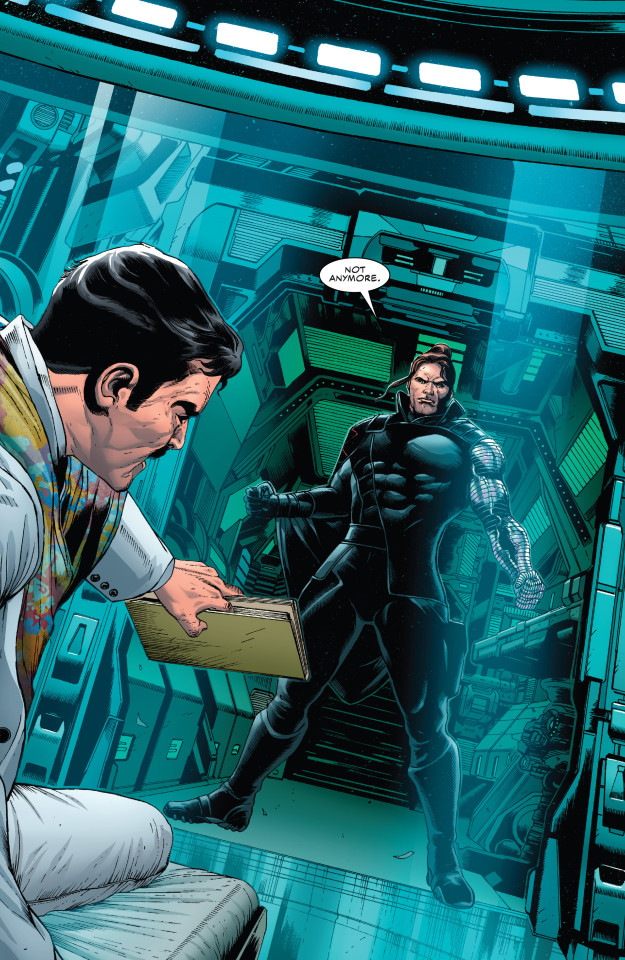

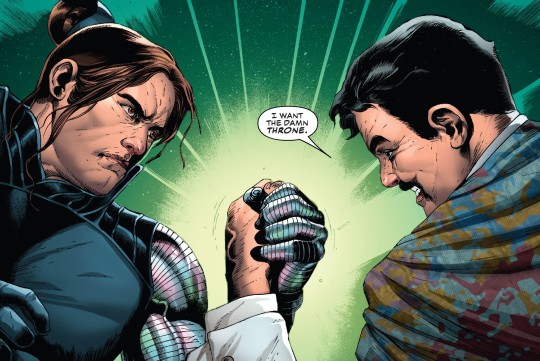
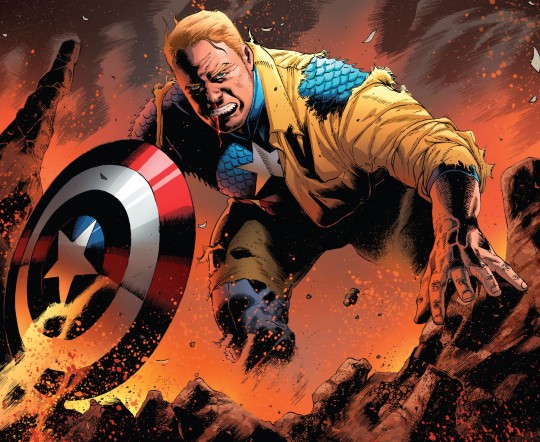


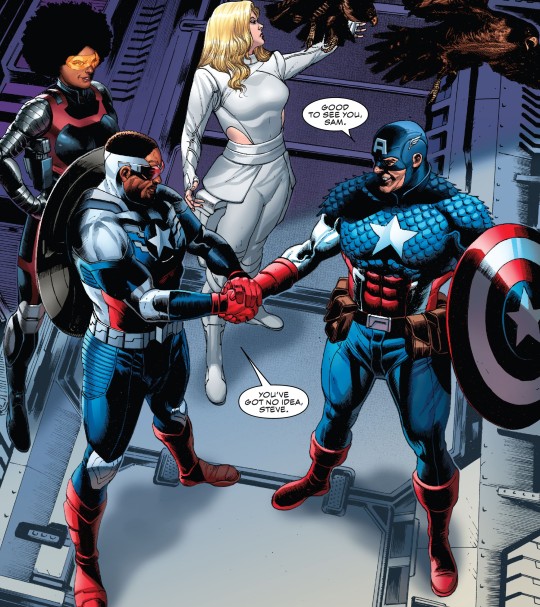
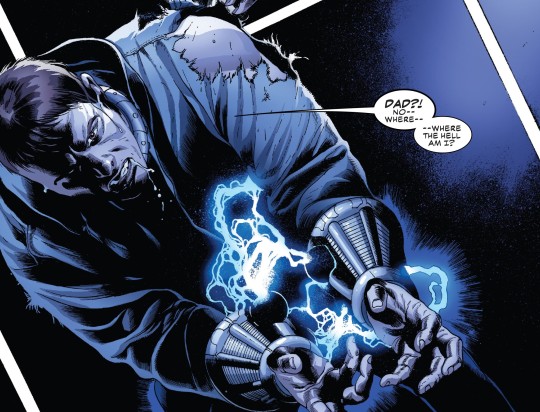



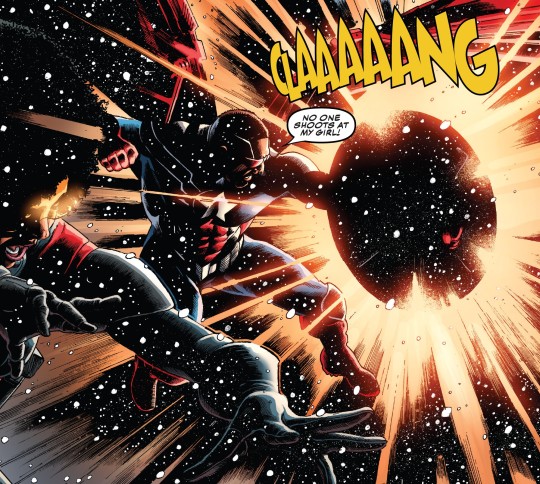
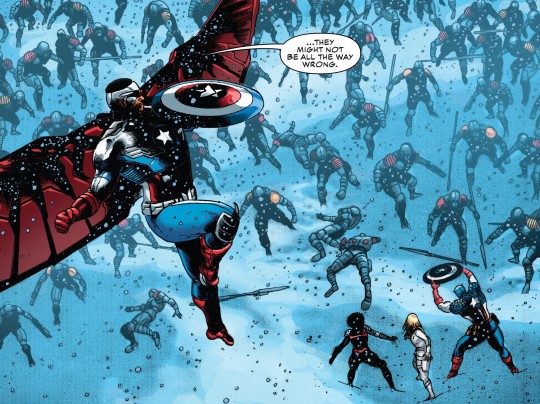


From Captain America: Cold War Alpha #001
Art by Carlos Magno and GURU-eFX
Written by Jackson Lanzing, Collin Kelly and Tochi Onyebuchi
#captain america: cold war alpha#white wolf#hunter#the new revolution#bucky barnes#captain america#steve rogers#nomad#ian rogers#the dryad#peggy carter#redwing#sam wilson#misty knight#marvel#comics#marvel comics
12 notes
·
View notes
Text
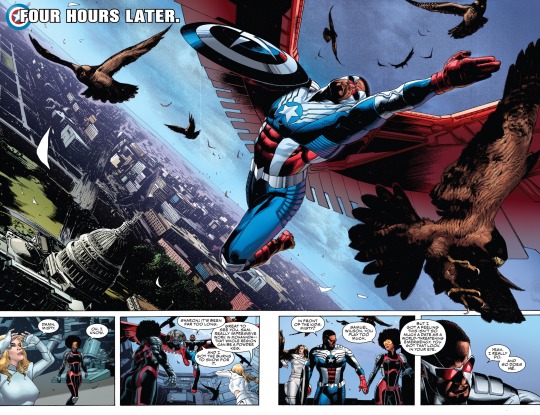


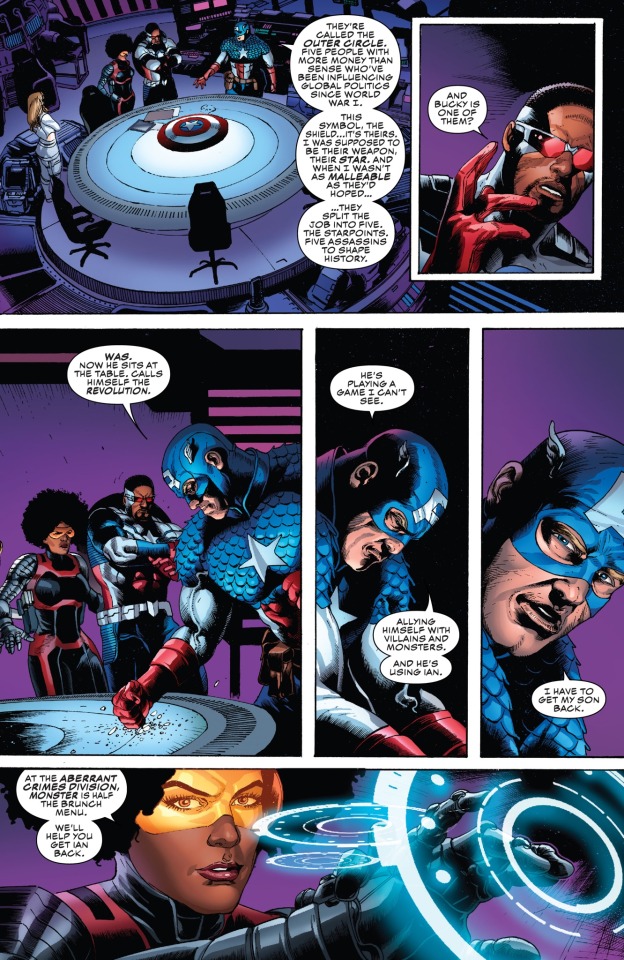


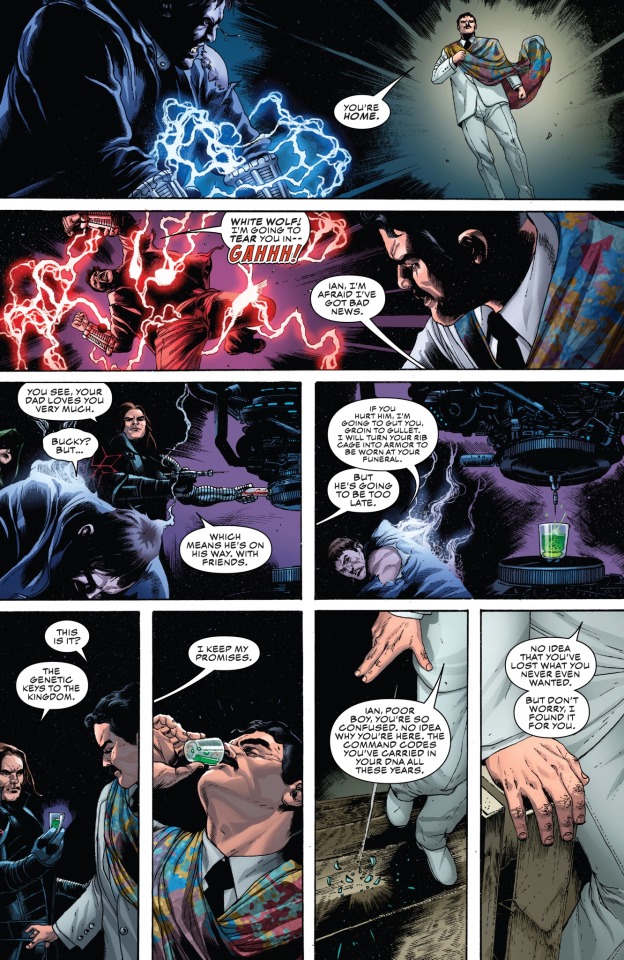



Captain America: Cold War Alpha #1
#cold war (marvel)#captain america#steve rogers#sam wilson#sharon carter#misty knight#ian rogers#the new revolution#bucky barnes#white wolf#dryad#peggy carter#marvel comics#marvel spoilers#matt reads a thing#i posted this
18 notes
·
View notes
Note
Hi! Im so interested in your alicent = richard nixon, rhaenyra = john f. kennedy parallels thing .Do you mind explaining?
Have a good day/night!
yeah so a lot of this is inspired by Nixonland by Rick Perlstein which is one of the best books you'll find on the 1960s and early 70s and Nixon in particular. really if you're interested at all in American conservatism check all his books out, they're amazing. also want to preface this with the fact that this isn't based on their political ideologies because neither Rhaenyra nor Alicent really have one beyond "Targaryen absolutism" and "Faith-backed feudalism" respectively. there is no left and no right because there is no French revolution
but basically, Perlstein's thesis is that a lot of how Nixon viewed politics and how he gained power went back to his time at Whittier College. now Whittier had a couple of prominent social clubs, most notably, the Franklins, which were old-money, sophisticated elites. Nixon was not born into wealth - he was born to a family that did own a bit of land/business, but constantly struggled to make ends meet and were always precarious. for lack of a better term, he was white trash - the "used car salesman" thing is actually a jab at this since it's a middle-class but low-prestige occupation. naturally, he did not gel well with the Franklins at Whittier, and so he was one of the founding members of a new social club for the ladder-climbing social strivers who also felt looked-down upon by sophisticated elites: the Orthogonians. John F. Kennedy, on the other hand, was probably the living embodiment of the "Franklin" - even his liberalism came from the type of noblesse oblige that infuriated the petit-bourgeoisie Nixon. so losing to Nixon kind of drove him crazy.
you can do even more psychoanalysis on Nixon and his class resentments of liberal elites (READ NIXONLAND) but i'll stop it there. Rhaenyra is a Franklin: she has never once been in doubt that she will live an extraordinarily privileged life. For her, being an elite comes so naturally that she often doesn't even register that she is an elite. encounters with the lower classes engender a mix of disgust and patrician obligation. Though this self-assuredness can make her arrogant and reckless at times, it also gives her a sort of magnetism that draws people to follow her (Alicent, Criston, in the books all those random petty lords and hedge knights and smallfolk in the Riverlands who remember the Realm's Delight). She has vaguely liberal/cosmopolitan sensibilities (caring too much about homosexuality or adultery is just so gauche, darling), but isn't a revolutionary.
Alicent, on the other hand, is an Orthogonian. she doesn't come from nothing - far from it! but the privileges she does possess don't come from dynastic wealth, but her father having a good job that he got through (relatively) meritocratic means. Alicent and Otto are painfully aware that whatever privileges they possess come from Otto being useful to the Targaryens, and should either make a misstep, they would have to go to their brother/uncle on bended knee to beg for a handout. This makes both Otto and Alicent both deeply neurotic and even paranoid, but also extremely hard-working and driven.
important to keep in mind that neither of these are strictly speaking "good" things to be and the vast majority of Westerosi people (peasants, laborers, pretty much all commoners except maybe wealthy merchants or artisans) do not fall into either of these categories
22 notes
·
View notes
Note
Hello! If Daenerys returns to Meereen, what do you think will happen to Skahaz? I can see him presenting Barristan s murder as the work of the Harpy, but killing all those child hostages? Any way he wiggles out of that?
I tend to think that the horror of the murder of the child hostages will be seen through Barristan's eyes, rather than Dany's. Barristan was the one who more recently, and just as vehemently as Dany, argued with the Shavepate over killing the children; Barristan is the one who helped reinstate the Shavepate as a leading power player in Meereen; Barristan is the one who left Skahaz as the most prominent member of Dany's court/entourage not on the battlefield itself. For Barristan, who already deeply distrusts the secrecy and brutality of Skahaz and his Brazen Beasts, the Shavepate's murder of the queen's young cupbearers will I think be the ultimate betrayal: the allusion by Barristan to the murdered children of Prince Rhaegar, whom Ser Barristan was unable to save from Tywin's vicious sacking of King's Landing, will I believe prove a tragic prophecy, as his sometime ally stands over the "bloody bodies" of murdered Meereenese children. In turn, just as Barristan swore not to condone such an act, so I think Barristan will attempt to prove what he said in his mind he would have done with Robert - namely, that "[i]f [Barristan] had seen him [i.e. Robert Baratheon] smile over the red ruins of Rhaegar's children, no army on this earth could have stopped [Barristan] from killing [Robert]".
To this point as well, I also tend to think Dany is not going to be returning to Meereen immediately at the beginning of TWOW. Dany is definitely going to return to Meereen, to be sure, albeit I think relatively briefly, but she has more immediate problems - and different semi-mystical or overtly mystical demands - temporarily pulling her away from the conflicts of Meereen - namely, Khal Jhaqo and Dany's foreseen return to the Mother of Mountains, there almost certainly to be acclaimed as the stallion that mounts the world. As a result, I don't think Dany is going back to Meereen until well after (again, relatively speaking) the time of the murders has passed, giving Skahaz plenty of time, if he might so choose (and if he remains alive to do so, of course), to come up with a plausible cover story for the murders of not just the children (and, probably, Hizdahr and Reznak), but also Barristan himself (a skill Skahaz definitely has, given his plot with the locusts and his successful framing of Hizdahr for that poisoning).
All of this is to say that Dany may not be in the best position, on a strictly narrative level, either to know precisely or learn later what happened with respect to Skahaz and the child hostages or, as a consequence, to react with the sort of disgust and fury I think we'll definitely see through Barristan's perspective in this moment (which, to be clear, I think she absolutely would if and when she should ever learn the truth). I don't know that any of Dany's courtiers or new would-be advisors would know or have reason to know precisely what happened with respect to Barristan and Skahaz, especially if Skahaz publicly proclaims that it was the no-good-very-bad Sons of the Harpy who killed the old white knight and the child cupbearers. Too, I don't think Dany is going to be particularly invested in sticking around in Meereen, and so she may simply accept Skahaz (again, if he is still alive) as a suitable enough regent in her name in Meereen, or king in his own right, to continue the revolution she started. Of course, Skahaz may not survive at all - always a distinct possibility, given the instability of post-Dany Meereen exacerbated by the sudden influx of outside power players following the battle outside the city's walls - making the whole question potentially moot.
23 notes
·
View notes
Note
Hi there, I hope this is ok. I thought about asking on the twitsphere, but you understandably left.
Anyway, I am an older student at Portland State University and today we were discussing your lovely short story "The effluent Engine".
What I was curious about was the timeline of the story. For instance, it took place two generations after the Haitian Revolution, which of course ended in 1804, which would place the timeframe around or after the American Civil War.
Then, the Order of the White Camilla was, as you know, founded in 1867.
So, my question is what is the timeframe of the story? Did the Civil War actually happen in your world? Or is it up to the reader to decide for themself?
Anyway, thank you for your time. I love your work.
Nathan Tompkins
Hi there! What a cool question.
Mostly the answer boils down to "this was an alternate universe and I pulled details from history, but it obviously isn't real history, so please still treat it as fiction." That is, I used part of the name of the Knights of the White Camellia, but it's not meant to be the actual organization (the real version might have been into espionage, IDK, but mostly afaict they were just wealthy violent racists who considered themselves too good to rub elbows with "trash" in the Klan). That's why I changed the name very slightly to "the Order of the White Camellia," instead of the Knights. I also made substantial changes to Norbert Rilleux, who really did invent a bunch of amazing stuff, some of which got blatantly stolen from him due to racism... but who probably wasn't as obnoxious as I wrote him to be. There's no evidence his sister Eugenie was lesbian or bi, either (but also no evidence that she wasn't...). Such is fiction.
As for the Civil War in that world, I do believe that Haiti becoming a successful superpower with an effective air force would either have a) supercharged secessionism in the South leading up to the war, and thus triggered the war earlier... or b) it would have made the architects of the war very wary, because it would be easy to see AU Haiti as a knife laid right at the South's throat. That might have delayed the war. So I went with B.
But really? I wasn't thinking about the Civil War. I just wanted to write a cute swashbuckling old-school adventure-romance with a couple of Black lesbians fucking up racists. I wasn't aiming for historical accuracy at all, lol.
132 notes
·
View notes
Text
A SHITTON OF HOMESTUCK FIC RECS

The Vienna Game
Pale Solrezi, Rose n Dave are AIs, the world building absolutely FUCKS.
Caffeine High
Red Dirktav and Pale SolTav, a coffee shop au, IN SPACE.
General Vantas Gets Hitched
JohnKat, Fantasy arranged marriage au with political intrigue.
Your Cold Bare Hands, They Hold Too Tight
DirkJohn, Crockercorp Striders and lots of homoerotic fighting, Alpha Dave is. Hot.
Something Involving Arson
DirkJohn, One if my favourite fics, makes you laugh but has an underlying mystery that makes you wish it wasn't a oneshot, in a good way.
The Finer Details Of Gay Cluckbeast
DaveJohn, they get married, as bros, of course.
How To Stop Time
Davesprite, Jade and John on their three year journey, featuring minor jadedavesprite, aroace john, and lots of emotions.
Hot Disaster Dumbass Factory
Pale Soldave, University AU, Eventual Heavy Angst, It's a shitshow.
Dire Straights
DirkJohn, Earth C, John is so deep in the closet it hurts.
Catacombs
JadeKat, DirkJohn, Fantasy + Political AU, Three long fics that are all incredible.
Godfeels
Multiple Fics, messy coming outs and themes of self discovery, June Centric, Junerezi, June is powerful and finally herself and that scares people, So much angst omfg.
Dayvhe's Broken Diamond Club
Trollstuck, Slowburn Pale Soldave and other quadrent and non-quadrent bullshit.
Knight Of Spades
Doomed Timelines, Pan-Quadrent Davekat and Polyamorous Meteor Crew, not even fucking around this fic changed something in me.
So What’s The Return Policy For Emotional Damages?
Non-Sburb, RoseMary, First Meeting with snarky broads and shittier flirting.
Ruby Red
Short n sweet RoseMary, seriously, my teeth are rotting over here.
There will be Singing about the Dark Times
Non-Sburb Davekat, Alternia is horrible, Revolution Based.
meeting people the old fashioned way
Crackfic, University AU, Davekat, first meeting. Enough said.
So we dont kill the ones we love
Non-Sburb, Davekat, VERY EXPLICIT SO HEED TAGS, Troll/Human Society, Criminals, God I love fictional politics.
Cozy as fuck in here
DaveJohnKat, Crackfic, John catches Dave and Karkat making out in a closet, literally and figuratively.
Special Delivery
DirkJake, Non-Sburb, Dirk is a pizza guy and Jake is a rich kid with ISSUES.
You Can't Break That Which Isn't Yours
Transgirl Rose Fic, Very Gender, Much Introspection.
But I cannot lose a friend and a lover
Pesterlog, Earth C, Post-Divorce June and Roxy being mates, Junes trans but doesn't know it yet.
Loophole
Pale Johnvris, Adoption Fic, Petstuck, Sad Ending, Thinking about this one actually made me tear up.
In Which Dave Strider Gets a Roommate (and a Little Bit More)
SolDave, University AU, there is nothing more homoerotic then having a roommate.
Alternate Universe
Magical AU, University AU, Amnesia, SolDaveKat, can't say much without spoilers, but TRUST ME OKAY.
Space Bro
SolKat, Post-Sburb, Reincarnation? I guess?
Lost Teeth Like White Jewels
Hemostuck AU, Pirates, Erikar, Karezi and even more parings, seriously, what more could you need.
mary, mary, quite contra- is that a fucking wasp
University AU, Minor Rosemary, Crackfic, Wasps, Karkat and Kanaya being bros.
A Joker's Not Even A Real Playing Card Anyway
Crackfic, Crossover, Spades Slick ends up in Gotham, hilarity ensues.
Eschewal
DirkJake, Angst, Psychological Horror, Oh god someone give Jake a fucking hug PLEASE GUYS.
#homestuck#hs#homestuck fic recs#fic rec#fic recs#rosemary#davekat#soldave#dirkjohn#solrezi#johnkat#johndave#johndavekat#jadekat#dirkjake#junerezi#erikar#soldavekat#vrisjohn#dirktav#soltav#fic rec list#long post#trust me when i say theres more#but these are defo a good few
384 notes
·
View notes
Text
I Went, I Saw, I’m Back….
Today was Napoleon movie day and I lived to come back and report.
You know how you go into a movie with super high expectations when you have heard it’s the best thing ever, then inevitably find it less than you expected? The reverse happened a bit for me, everyone had hated this so my expectations were low, and though the movie is problematic, because everyone I read was losing their minds, it wasn’t that bad.
That is not to say it was good.
So for me it’s a mixed bag of stuff. Things I liked and and things I did not.
The main problem with the movie is that it tries to fit everything in it and therefore nothing works because everything is trying to be in there. Since they try to cover everything, nothing is covered and everything suffers, including the flow of the movie. It’s one of the movies that I felt like I could see what they were trying to do, and maybe it would have worked if they didn’t slam everything in there.
So this is going to be a bit scattered because my thoughts are scattered. And warning: spoilers will be discussed.
I wish they would have just skipped the French Revolution altogether and assumed the audience had a working knowledge of it. Shoehorning it in didn’t work. We have a brief scene of Marie Antoinette running the halls with her children trying to escape arrest to then a fade out of her execution. Yes, it’s all wrong, she is too defiant, her hair is too long, her dress is wrong. I get what they are going for here and a defiant Queen is probably a bit more dramatic than one who apologizes to her executioner for stepping his his shoes. Napoleon in the crowd, even though he wasn’t really there, works in the dramatic licensing department and his reaction was actually good.
Then we are whisked to Napoleon getting into a meeting with Barras, who acts as a sort of a narrator to the audience to catch them up on the state of things and Toulon. What I dislike in this film is that they introduce the characters by flashing their names and titles on screen. Ugh. I do not like this. Napoleon gives his plans on what he’d do with Toulon and Lucien (he’s been mistaken as Joseph in some reviews) acts as interpreter to Barras over what Napoleon just said (What my brother is saying….) .
There is a bit of time spent at Toulon with Napoleon walking around the place and even melting cannons for new cannons. The British are brutes who yell at him calling him a “shitbag” and yelling at the locals to move their “fucking goats!” . No, they really had wandering goats.
The battle is intense. Now, I know a lot of complaints have been filed due to battle inaccuracies and too few of them. This isn’t a problem for me. I am not a scholar on Napoleonic warfare. I am a wimp when it comes to blood and gore. I dislike seeing people blown up but even hate seeing horses blown up more. So one of the first casualties of Toulon is Napoleon’s beautiful white innocent horse. It takes a cannon ball to the chest and it’s graphic and it makes me want to do a cry. The horse falls and Napoleon is thrown but regains his composure to go fight with one on one with some a combatant until someone else decapitates the guy with a sword.
One battle down more to go.
Barras magically is on scene to literally crown Napoleon general with a sword like the Queen knights people. Napoleon wanders away to his poor dead horse and fished out the ball lodged in the chest and hands it off to I think Junot with instructions to give it to someone. I thought I heard “for mother” but that can’t be it….can it?
Now we are back to revolution stuff and Robespierre is being denounced. Why are we putting this in here? It’s too…whatever. He runs out of the chamber, tries to shoot himself when he can’t shoot the chamber and of course just ends up wounding himself in his jaw. Barras pops over to put his finger in the wound (ew sir) and tells him he missed and off to the guillotine for you “dear friend”.
Enter Josephine. She escapes her prison in her dramatic cloak where she is hugged by a nameless woman.
Enter Napoleon being instructed by Barras on the civilians uprising. There is a scene of Napoleon wandering through a crowd of citizens shouting long live the King. Napoleon places his cannon, the citizens line up and then boom! More bloodshed for everyone. People are mowed down, blood spray. The back crowd runs off and the camera pans to a woman trying to crawl away with her severed foot in the street. No horses dead thankfully.
Back to Josephine in her cloak walking empty Paris streets and looking at various overturned debris. Is she just walking the streets for days? Is she coming upon the whiff of grapeshot? We don’t know.
Napoleon is now wandering around a Survivor’s ball. The lighting is gorgeous in here. Josephine has ditched her cloak for a dress her boob might escape from at any moment. She’s sitting with Barras with her insane asylum haircut and red long gloves and red ribbon neck decoration. Napoleon looks bored. Later Napoleon is still wandering around and Josephine is hanging out gambling. She notices Napoleon starring at her and confronts him. Here we meet Josephine with her dramatic British accent and Napoleon’s awkward American one (but it strangely fits all the same). She asks why he was starting and there is some back and forth but no lines from the trailer with her “has the course of my life change Napoleon?” Instead Napoleon tells her not to tell him her name and she stares at him and wanders off to gamble some more I guess. What?
Next is the scene with a very small Eugene doing the probably made up Napoleon myth scene of “Can I have my father’s sword please sir?” Napoleon and Junot have been throwing shit at the wall before this for…reasons. Napoleon explains to Eugene that he can’t give back the sword because citizens can’t have weapons. The boy says it’s a rememberance of his dead father. Napoleon asks what he is doing there and the boy says his mother said that Napoleon could. Napoleon then goes to a room with loads of swords that were taken from the executed officers. Napoleon asks if anyone thought to put names to them but no, they did not. Napoleon grabs a random sword and heads to chez Beauharnais. There everyone seems to know him, including the help, and he gives the maybe sword back to Eugene. Everyone thanks him and Napoleon tells Josephine that he gives his compliments to the house chef. ???
Now Napoleon has random meetings with Josephine that I guess is supposed to be their abbreviated courtship. Josephine stares into her makeup mirror and wonders aloud to her maid (Lucille) if she looks in love. They have random conversations about how her husband was executed in front of his mistresses. How she tried to get pregnant in prison to save her life. Will any of this bother Napoleon? Napoleon answers “no, madam”. She flashes him her nether regions and Napoleon just stares. Awkward. Some old lady behind me in the theatre went “oh!”
Oh well then it’s time to get married.Josephine has the fastest growing hair in the history of the world. Last scene she was a mental patient, now her hair is shoulder length. They are giddy, well Napoleon is, at the register’s. They are sure to share Josephine’s real name but then announce that Napoleon was born in February. What? Didn’t he just change the year and not the month of his birth? But none of it matters since they never discuss their age difference anyway.
They have a dinner party where Josephine flirts with Hippolyte Charles with Napoleon glowering and then we cut to the sexy time scene where Napoleon and Josephine have sex doggy style! Oh God. Cringe. Napoleon talks of having a son. Napoleon is very broody in this movie.
Napoleon is now in Egypt. Italy is mentioned only in a letter voice over where he happily informs Josephine that he was victorious in Italy. He wonders why she isn’t writing. Insert scenes of a naked butt Charles romping in bed with Josephine. Napoleon and the mamalukes line up by the pyramids and Napoleon fires the cannons. They hit the pyramids and then he just wanders away. Is this the battle? Lol One mamaluke falls off his horse. No horse casualties.
If you ever felt that General Dumas never got his moments to shine, well he is in this movie. He’s not singled out, you just have to know it’s him. He accompanies Napoleon to see a mummy. Napoleon looks at the mummy and goes to touch it’s cheek and the mummy shifts away from his touch. Is this like some omen that like Josephine, even dead mummy’s don’t want Napoleon touching them? Lol
Junot later informs Napoleon while they eat that Josephine is unfaithful. Napoleon tells Junot that he gets no dessert and to leave, which he does. They later meet up again and Napoleon tells him he’s off to France.
Napoleon lands to fanfare in France and greets the crowd with smiles and waves. He gets in the coach, finds an English paper making fun of him and Josephine’s affairs. He waves at people out the window. He arrives home to No Josephine but dogs! There are a lot of dogs in this movie that is a win for me. He questions Lucille on her whereabouts, throws wine at her and tips a chair over. Josephine arrives to her luggage in the yard and she goes to the locked door and….next scene she is in tears and Napoleon is yelling. She is a “selfish little pig” and how could she do this…why didn’t she think of his feelings? Josephine says sorry and Napoleon makes her say she is nothing without him.
The scene cuts to the first of many scenes of Napoleon sitting awkwardly on the couches with their heads on the back cushions staring at each other. Lol. Can’t they sit normal? What are these two adults doing? Here Josephine makes Napoleon recite to her that he is a brute that is nothing without her and “your mother”. Oh boy, Napoleon is a mama’s boy too.
Napoleon has a meeting with those in charge which is a great scene of him telling all of them that they aren’t fit to run France. They accuse him of deserting his army in Egypt. He points out one by one why they can’t serve getting to one man and saying “though you can scowl very well!” He marches out saying that they have nerve questioning him when they have ruined France and he has found out his wife is a slut.
Napoleon has brunch with Sieyes and he invites him to a coup. Scenes follow of the various men being arrested or asked to step down. One man tries to escape by running up the stairs and then getting into a slap fest with two soldiers. Dumas arrests another man who says he can’t believe this he was just about to have a “scrumptious breakfast!” Dumas escorts him out leaving his hysterically crying wife saying “enjoy your breakfast”. Talleyrand tells Barras of his dismissal to which Barras says he will gladly go back to being a private citizen.
The coup is hysterical. But it was, wasn’t it? Napoleon gets manhandled and runs away falling down a flight of steps and barricading the door from the mob. He can barely stand up. Now I know some of this rubs scholars the wrong way but the coup was about as good as this. Napoleon was given a horse that he couldn’t control and was almost thrown off.
Now Napoleon is talking to Caulaincourt who talks to him about the czar. This scene actually works well. Napoleon walks around questioning and using his knife to hack away at the furniture.
Napoleon confronts an ambassador and screams at him. Here is where he shouts “you think you are so great because you have boats!”before stomping out. It is laughable but again, Napoleon was known to do this at times. He did kick one ambassador in the stomach once for no reason.
Talleyrand says hey why don’t you become Emperor. Napoleon laughs and pinches his ear.
Napoleon leads an older woman around. You guessed it! Mama is on scene. Napoleon walks her over to Josephine where Madame Mere says “This must be Josephine!” They nod at each other and then Madame Mere says “Is that Charles?” and wanders off to talk to Talleyrand. Who knew they were friends?
Napoleon still is broody. He walks in on Josephine dressing and acts like a horse, baying and stomping the ground. Josephine dismisses the maid and says “you nasty man” and more doggie style sex! She tells him her nether regions are his. Cringe.
Napoleon the next morning questions Josephine on why she isn’t pregnant. She makes excuses but says she has been busy cleaning up his messes. Napoleon whimpers again, crawls under the table and grabs her.
It’s coronation time baby! No lead up, just happens. Hippolyte Charles is there to give the evil eye to the imperial couple. Josephine looks at him as she walks by. Barras comes out of nowhere to get a prime seat up at the Dias. The pope is pretty enthusiastic proclaiming Napoleon emperor. The end.
Now Napoleon is watching David paint his portrait with a model as Talleyrand says he needs to divorce.
Now we are at Austerlitz. This is beautifully shot. There are lots of blood in the water and sadly dead horses. This doesn’t seem to be a lake they are falling into, but the ocean as they sink sink sink forever.
Now Napoleon is chatting up Emperor Francis.
Now there is a montage of happy Napoleon and Josephine moments. Napoleon plays with a dog while Josephine smiles. Napoleon and Josephine share a bath.
Now Napoleon and Josephine sit at a dinner party and Napoleon asks in front of everyone why isn’t she pregnant? Awkward. Josephine says there hasn’t been much love making in the place. Awkward. Napoleon’s mother is even like “ew”. Napoleon says that is a lie. There has been years and years! Josephine fires back that he is a fat fat fatty. Napoleon says that is true, he likes to eat, destiny brought him this lamb chop. Josephine throws food at him. Napoleon throws food at her. She throws more. WTF is going on here? No lie, an older man behind me in the theater whispered in this scene to his wife “he’s probably been putting it in the wrong hole. “
Madame Mere is the one and not Caroline to tell Napoleon she has rounded up a girl for him to see if he can get her pregnant. She says it’s time to know who is at fault. Napoleon and she drink brandy while Napoleon studies his feet. She says the girl, Elenore Denuelle, is waiting for him naked in the bed. Napoleon asks if he can have another brandy. He pauses at the door while mama shooes him in.
Next scene Madame Mere tells Napoleon the happy news of Elenore’s pregnancy.
Napoleon and Josephine have an awkward stare conversation sliding down on the couch.
Napoleon announces over dinner with Josephine the divorce. She tears up but then laughs. Napoleon leaves in a huff.
The divorce scene. Josephine has tears rolling down her cheeks. Napoleon sniffles and roughly wipes her face and his. He reads his statement. Barras is also somehow here too. Standing in the audience like a bad omen. Napoleon scolds Josephine to read her statement. She can’t get through it because she keeps laughing. I guess we are going for hysterical laughter but it plays wrong. And of course the history is that she cried so much she had to have the statement read by someone else. Here she gets slapped by Napoleon to her shock and everyone else’s but still laughs her way through it.
Josephine leaves in her carriage and lands at someplace that is Malmaison but is not Malmaison. She walks around gloomy. Napoleon visits her and puts his hat on her head. Tells her to cheer up.
Napoleon chats with the Czar and tries to marry his sister.
Napoleon is now meeting Marie Louise. Now the casting is all screwed up. Napoleon ages through the film but for some reason Josephine never does. Josephine is taller than Napoleon even though she was in reality shorter. Marie Louise is a black haired little thing when in reality she was taller than Napoleon.
Napoleon is given his son. He cries. He’s been wanting a kid for a long time, man. Napoleon takes the baby to Malmaison to visit Josephine who looks like for a second she might throw the baby over a Cliff.
Napoleon is off to Russia. Cossacks attack. Napoleon rips off little pieces of bread to his troops as they walk by. They fight at Borodino and Napoleon is leading a Calvary charge but what the hell? He’s wearing his Italian uniform. Since when did fat Napoleon get into his closest and grab up his ornate uniform? My guess is that this was meant to be Italy, they scrapped it for time and used this footage for Borodino thinking no one would notice.
Napoleon find Moscow abandoned including the Kremlin that has apparently been abandoned for decades as pigeons have taken over the place and have shit all over the czar’s nice throne. Napoleon fits so he sits. Birds continue to shit on it. I think this is supposed to be some poetic metaphor.
Napoleon wakes up flames. He comes out and asks who did this. Luckily the marshals are all there waiting and inform him. He wants to march to Petersburg. They tell him no because of winter. Napoleon puts his hands over his ears and then screams into his hat. Chill man.
Napoleon marches back in snow. Dead people. Men eating horses. Not the horses!!
Oh Napoleon is abdicating. That’s quick. Surprisingly Barras is missing from the audience.
Napoleon lands on Elba and parades around. Josephine greets the Czar and dances with him in a really stupid dress. Malmaison is always cloudy with fog and rain. Always. Every scene. Napoleon sees a paper on Elba that mocks him about Josephine entertaining the czar and him being cuckolded again. But they are divorced? He beats the paper on the table. He then writes to Josephine and tells her that he is coming back to France to reclaim his stuff including her. So I guess we don’t care about Marie Louise or baby anymore.
Btw, Josephine should be dead by now.
Josephine is shown being ill and the doctor telling her to open her mouth. He says her chest is congested and her throat inflamed and recommends going to bed. But she says Napoleon is coming over and over again. I don’t think Josephine ever called a Napoleon Napoleon either.
Napoleon gets on ship and lands on French soil. Kisses it. Josephine dies. Finally. Too late.
Napoleon greets his troops. They go to his side. He lands at Malmaison and learns from Hortense that Josephine is dead from diphtheria. Napoleon is mad at her. Why didn’t anyone tell him? He wants her letters that he wrote to her. Hortense says the valet stole them and sold them. Napoleon cries. Hortense apologizes and Napoleon says he forgives her. For what though?
Napoleon is at Waterloo. Rupert Everett is Wellington but all I can think is damn he’s old. I remember when he was a heart-throb in movies and now he’s old Wellington. Battle. Dead horses (no!!!) dead men. This is the longest battle filmed.
Napoleon is on the Bellerophon giving a class to a bunch of boys. Wellington for some reason comes for a meeting and Napoleon and he are rather friendly to each other. I wonder where Barras is? He could be here. He wasn’t. But he could be. Wellington dashes Napoleon’s hopes of remaining in England and tells him he will be off to St. Helena “a rock really”. Napoleon laughs.
At long last, Napoleon is on St. Helena with a voice over with Josephine talking to Napoleon. Next time she will be Emperor and he will have to listen to her. Napoleon is shown washing his face. Napoleon is shown drinking wine at his desk while plantblow out of the ground outside his window. There is a dead fly in his wine that he fishes out. Napoleon is at an outdoor table while Betsy Balcombe and some other girl fence with sticks. Napoleon grills them on the capitals of Europe. They do the Moscow story. How it was burned to get rid of the French. Napoleon asks who told them that and then throws dates at them as they run back to play. Another voice over from Josephine. She tells Napoleon she has prepared a place for him why doesn’t he come? We see Napoleon’s back and his famous hat from the back as he sits at the table. Come she tells him and we will try again. Napoleon drops over dead. Well, that’s not how it went but okay.
Jesus. That was a lot. I will do my final thoughts tomorrow.
42 notes
·
View notes